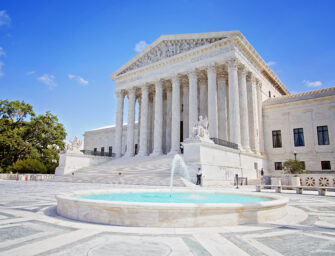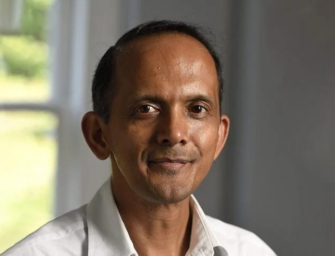AGU commits to 8 action areas to combat systemic racism
This is a unique moment for AGU. Since late May, nearly every committee and leadership group at AGU has been discussing how we – as a global community – must together address systemic racism. We have the opportunity to lead both as individuals and as institutions as we work together to build the equitable future we all envision and value. Moving from statements of solidarity and support, the focus is now on the essential tangible actions.
Our new strategic plan recognizes our responsibility to promote and exemplify an inclusive scientific culture and foster participation of all underrepresented groups across all levels of Earth and space sciences. This goal is one of the three pillars of the plan and is essential for our vision of obtaining a thriving, sustainable, equitable future for all. Now, however, is the moment for action to fight racism in our community. We have considered how best to use AGU’s convening power, our sense of community and our shared resources to create the inclusive scientific culture that we aspire to and wish we had joined when we started our careers.
Building on the call to action from Geoscientists of Color, notimeforsilence.org, and our conversations, AGU leadership has resolved to take eight bold, meaningful actions![]() now. Our commitments are aimed at systemic change to address racism and foster an inclusive culture. They impact where we invest our money; how we select our leaders; how we share our science; what work we do, honor and reward; and how we foster the next generation of scientists and leaders.
now. Our commitments are aimed at systemic change to address racism and foster an inclusive culture. They impact where we invest our money; how we select our leaders; how we share our science; what work we do, honor and reward; and how we foster the next generation of scientists and leaders.
AGU’s Board of Directors and Council have endorsed these initial actions to combat racism in our community. They have also provided input about the importance of maintaining our commitment to the inclusion of all underrepresented ethnic and racial groups and to those with similar issues of discrimination and exclusion, such as members of our LBGTQ+ community. Promoting diversity, equity and inclusion has many nuances and challenges around the globe. Those challenges will be part of our discussions as we develop detailed action and implementation plans, the latter of which will importantly include quantitative measurements and metrics.
We know that bold and meaningful actions are needed. These actions are the ones that AGU will start and commit to immediately.





I applaud AGU’s effort to foster opportunities for all groups who experience bias/discrimination in society. In the U.S., legal remedies only address several groups. For example, a married scientist does not enjoy the same legal protections against bias/discrimination as other legally protected groups.
I applaud these efforts by the AGU and hope they yield the fruits intended. As an additional note, I’d like to add the following. This may not be totally inclusive of racism, but as an African scientist (so someone who practices as a scientist regardless of race, merely African birth) I notice many posters and presentations at AGU that are based on Africa, yet do not include African representation. A very important paper has recently been published on this here: https://www.sciencedirect.com/science/article/pii/S0012825220303081. This paper shows a clear trend of high level papers dealing with African content not including African authors or collaborators.
As you can see, Africa as a whole is systemically biased against with regards inclusion, and beneath this are aspects of scientific imperialism, and very likely unconscious racism by virtue of superior funds and training at higher level 1st world universities which subconsciously other local knowledge or input. As an awardee of the AGU (Africa award) , I hope that this features in your decision regarding acceptance of papers at both meetings and in print. Seeing our research resources plundered without due effort to include locals is demoralizing and harmful to the equitable and inclusive growth of Science across the 3rd world.
Many kind regards
Andy Green
I am sure, these bold moves will reflect positively on the future of human society, it will help attained that dignified feelings each person would like to have within the human society.
5. Review diversity, equity and inclusion across AGU’s Publications. Building on our strong record of data-driven efforts, AGU will conduct an audit to identify inherent biases in the review, publication, and citation processes.
The 5th recommendation is a critical recommendation. Over the years, I felt that the reviews were biased, and too very long just for the first review based on being a black scientist. It did not just happen to me but also to a protege. I complained to the editors about this issue and the often overstepping reviews from reviewers. There is nothing that could be done. For that reason, I stopped submitting to JGR Atmospheres, GRL since 2014 and stepped away as an AGU member. Recently I have rejoined AGU (Dec 2018) and submitted to Geohealth and it seems much better. We this recommendation, I feel like maybe I could submit, but we will see what happens when I do. I might say that the consequences related to the past (long review times) have impacted my grants and for younger faculty would impact their annual reports and potentially tenure package.
This recommendation will go far in protecting future faculty members of color in the review process. Other journals should follow your lead.
Gregory, I’d be interested to hear more about your experiences. We’ve been working to reduce bias, expand peer reviewer pools, and increase inclusion in our books and journal boards, but we still have much more to do. We’ve recently joined several groups committed to sharing data and best practices within in scholarly publishing so that we can learn from others and others can learn from our community as well. My contact information is on the AGU Publications page if you have more you would like to share. https://www.agu.org/Publish-with-AGU/Publish
I commend AGU’s proposal to combat systemic racism. Perhaps the organization could begin in the area of scientific peer review. The latest issue of “EOS” that I received included photos of 185 scientists cited for provided exceptional reviews of articles submitted to AGU journals. Not one of those 185 scientsts appeared — at least to my aging eyes — to be a black scientist.
I noticed this as well.
Review your prize committee processes. Accomplished minority scholars with publications in Science, Nature, etc. get overlooked. I know from experience.
[…] Committee, which will continue to focus on diversifying AGU’s volunteer leadership positions, one of the eight decisive actions released in August 2020 that AGU committed to making to remove systemic racism in […]
[…] Committee, which will continue to focus on diversifying AGU’s volunteer leadership positions, one of the eight decisive actions released in August 2020 that AGU committed to making to remove systemic racism in […]
[…] (at the time) AGU President Robin Bell and President-elect Susan Lozier released the 8 action steps we’d take to combat systemic racism, they noted that “bold and meaningful actions are needed.” We have been and will continue to […]
[…] Committed to the eight action steps to combat systemic racism. […]
[…] Released the eight action steps to address systemic racism. […]